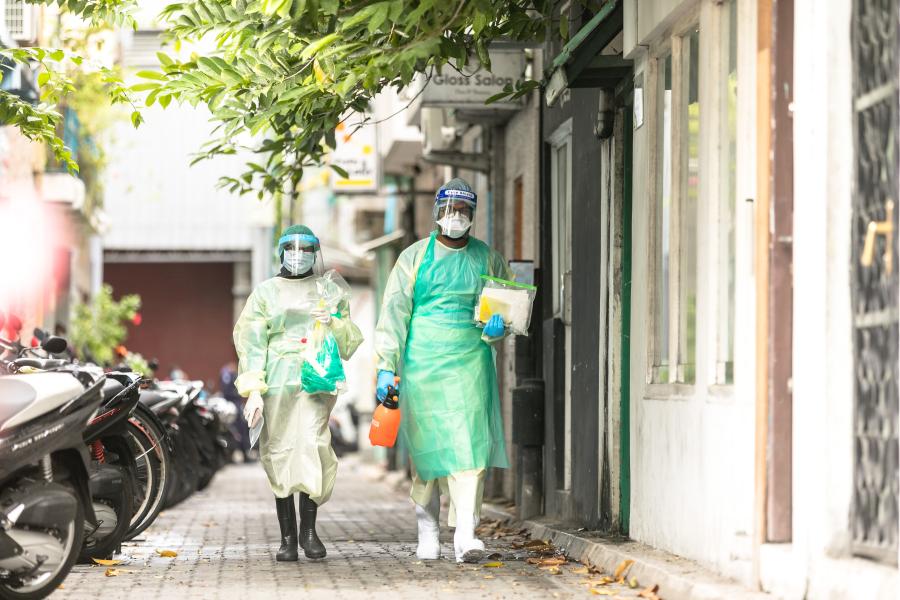WHO Helps Maldives Build Laboratory Capacity to test COVID-19
15 March 2021
- Joint efforts by WHO and Ministry of Health, proactive measures and critical technology transfer by WHO to strengthen laboratories have helped Maldives manage COVID-19 infections. Going forward, medical teams and labs will be even better equipped to learn from their initial experience and continue to ensure speedy identification of cases and their treatment as per protocols.

Maldives can now test COVID-19 samples in its laboratories and no longer needs to ship them out of the country. The testing capacity built with WHO support is critical for rapidly detecting and rolling out timely response to COVID-19 cases.
Currently nearly 700 samples can be tested every day, and the capacity is being scaled up further and expanded beyond Male to atolls.
Even before the Maldives got its first case of COVID-19, WHO worked closely with the Ministry of Health to strategically prioritize strengthening and expanding the laboratory capacities and optimizing laboratory functions and services.
"WHO continues to be a prominent partner in supporting development of the health sector of the Maldives. Strengthening health laboratories has been one key support area among others. The recent support provided to do the first ever COVID-19 test in the Maldives, continued testing, and expanding testing capacity in the regions of the country are notable and invaluable assistance in this long standing partnership," said HE Abdulla Ameen, Minister of Health for Maldives.
Anticipating a rise in cases, WHO and the ministry focused on training laboratory staff in testing protocol, coordinating quality assurance, ensuring availability of enough lab kits and ramping up capacity at the Indira Gandhi Memorial Hospital (IGMH), which is at the forefront of the pandemic response.
WHO has been focused on development in the field of diagnostics, one of the most critical factors in effectively dealing with COVID-19 cases. As early as end February 2020, WHO had introduced RT-PCR (Real time; Reverse Transcriptase- Polymerase Chain Reaction), a test that ensured high level of accuracy and minimal chance of missing any case of infection.
As a result, within weeks of the outbreak, Maldives could test and diagnose more than 700 cases a day. This was a significant milestone for the country, given the importance of timely and quality testing in a fast-evolving pandemic situation like COVID-19 with the added risk of community transmission and an overwhelmed public health situation.
In another step to enhance laboratory capacity, the laboratory of Maldives Police Forensic Services was strengthened for RT-PCR Testing and logistics chain, sample collection and referral carriers were also put in place.
“Recognizing ‘testing’ as potential game changer in Maldives’ preparedness and response to COVID19 outbreak; WHO facilitated timely transfer of knowledge and technology to the laboratory in Indira Gandhi Memorial Hospital in Male’ City, actually ahead of the first diagnosed COVID19 case,” said Dr Arvind Mathur, WHO Representative in the Maldives.
“As a trusted and responsive technical partner of Government and people of Maldives; WHO is supporting further expansion of lab testing capacities in the country,” he added.
WHO and the Ministry of Health have begun preparations to expand laboratory capacity beyond Male to other atolls. WHO is working to establish RT-PCR testing capacity in two regional hospitals. The physical space and structure are being put in place as per WHO guidelines and the training of lab technicians from these atolls has already begun at IGMH.
Maldives was able to build laboratory capacities in a timely manner because of early actions by Hon Health Minister and at the highest government level Maldives President, HE Mr Ibrahim Mohamed Solih, took several initiatives, including the establishment of the National Emergency Operations Centre (NEOC) to address the pandemic and seeking WHO support to strengthen the country’s laboratories, in addition to procuring and streamlining the most critical aspects of the pandemic – detection, testing, tracing, isolation and treatment.
Joint efforts by WHO and Ministry of Health, proactive measures and critical technology transfer by WHO to strengthen laboratories have helped Maldives manage COVID-19 infections. Going forward, medical teams and labs will be even better equipped to learn from their initial experience and continue to ensure speedy identification of cases and their treatment as per protocols.

